Phone hacking: CPS calls end to prosecutions
- Published
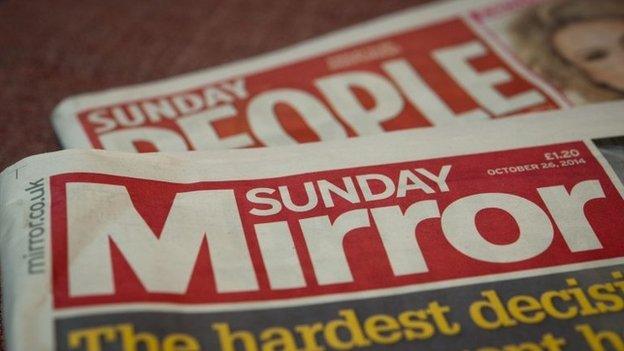
There is to be no further action taken against journalists over phone hacking, the Crown Prosecution Service has said.
It said there was "insufficient evidence" to bring corporate liability charges against News Group or charges against 10 individuals at Mirror Group.
Piers Morgan, ex-Daily Mirror editor, who was questioned about phone-hacking allegations, welcomed the news.
News UK, parent company of News Group Newspapers, said, external "the right decision has been taken" by the CPS.
The police investigation into phone hacking began in 2011 and uncovered "a vast number" of victims.
It began the saga that led to the conviction of the former News of the World Editor Andy Coulson, the closure of the 168-year-old News of the World and moves to change the way newspapers are regulated.
A total of 12 prosecutions for offences relating to phone hacking were brought and there had been nine convictions, the CPS said, external.
Coulson, a former spokesman for No 10, was jailed for 18 months for conspiracy to hack phones in July 2014.
In a statement, the CPS said corporate criminal liability could not be attributed to the company through Coulson's actions because he could not be considered to have been the "controlling mind and will" of News Group.
It also said the call data it had looked at from Mirror Group Newspapers could not be proven to be "definite instances of phone hacking", nor shown to have been carried out by particular individuals.
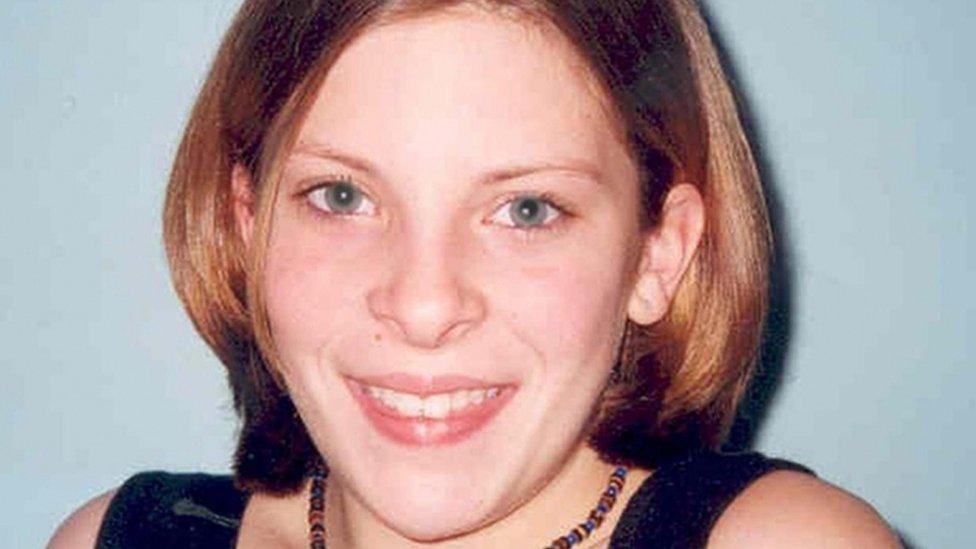
Messages left on Milly Dowler's voicemail were intercepted after she went missing
The News of the World closed down in 2011 after its owners, Rupert Murdoch's News International - now named News UK - admitted the scale of hacking that had been going on, dating back many years. There had been a public outcry over reports that Milly Dowler, a teenager who was abducted and murdered, had her voicemails hacked.
Coulson and former editor Rebekah Brooks were charged with conspiracy to intercept mobile voicemails alongside others connected to the newspaper.
Mrs Brooks, who returned as News UK's chief executive this year, was cleared of all charges.

Analysis
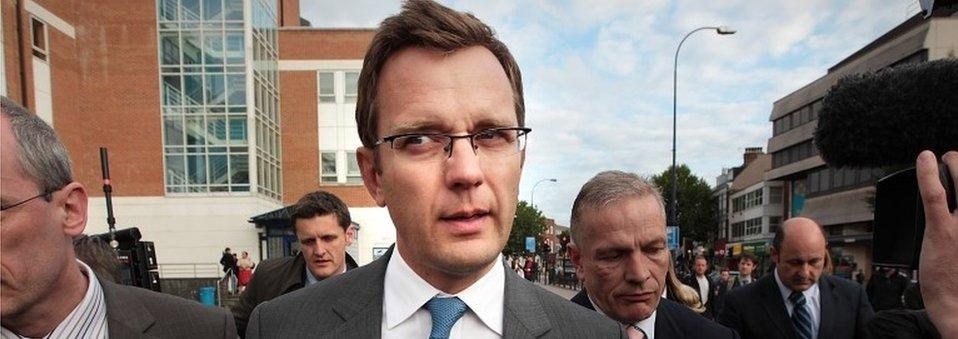
Former NoW editor Andy Coulson was jailed for 18 months
By Peter Hunt, BBC diplomatic and royal correspondent
Since the News of the World closed in 2011, there's been an intense focus on the behaviour of Scotland Yard - where three senior figures resigned - on politicians, and on journalists.
First there was Leveson; an inquiry which imperilled, briefly, Jeremy Hunt's cabinet career and embarrassed David Cameron - a prime minister once prone to signing off texts LOL.
Then came the Old Bailey trial which ended with Rebekah Brooks walking free and her former lover, Andy Coulson, a convicted criminal. Hacking, we learned, had been carried out on an industrial scale at their old paper between 2004 and 2006.
The victims, nearly 300 of them, included the then Kate Middleton, targeted on Christmas Day and Valentine's Day, and four senior members of Tony Blair's government.
For years, despite growing evidence to the contrary, the NoW's publisher stuck to the lie that hacking was the work of a single rogue reporter. Now, Rupert Murdoch's company insists it has apologised, paid compensation, and reformed.

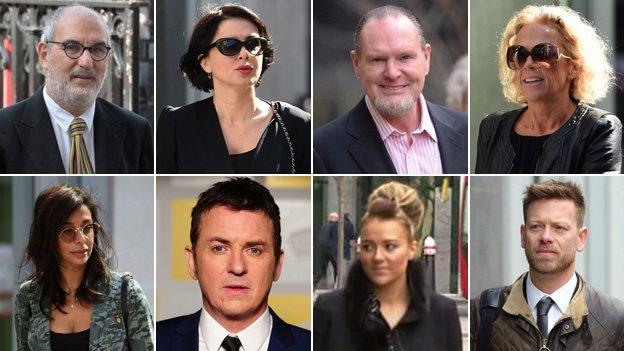
Celebrities including Sadie Frost, Paul Gascoigne, and Shane Richie won damages totalling more than £1m from Mirror Group
Eight people whose phones were hacked by Mirror Group journalists - including Sadie Frost, Paul Gascoigne, and Shane Richie - won damages totalling more than £1.25m earlier this year. Mirror Group has appealed against the decision.
Dozens more claims are expected to be heard next year.
Solicitors representing phone-hacking victims said civil cases against both Mirror Group and News Group were "absolutely not" affected by the CPS decision.
Welcome news
Director of public prosecutions Alison Saunders said: "These decisions bring the CPS's involvement in current investigations into phone hacking to a close."
A Metropolitan Police statement highlighted the nine convictions resulting from its investigations.
Assistant commissioner Patricia Gallan said: "Those that suffered from having their phones hacked included those who were already victims of crime, and all were greatly affected by the intrusion into their personal lives and the mistrust and paranoia it caused."
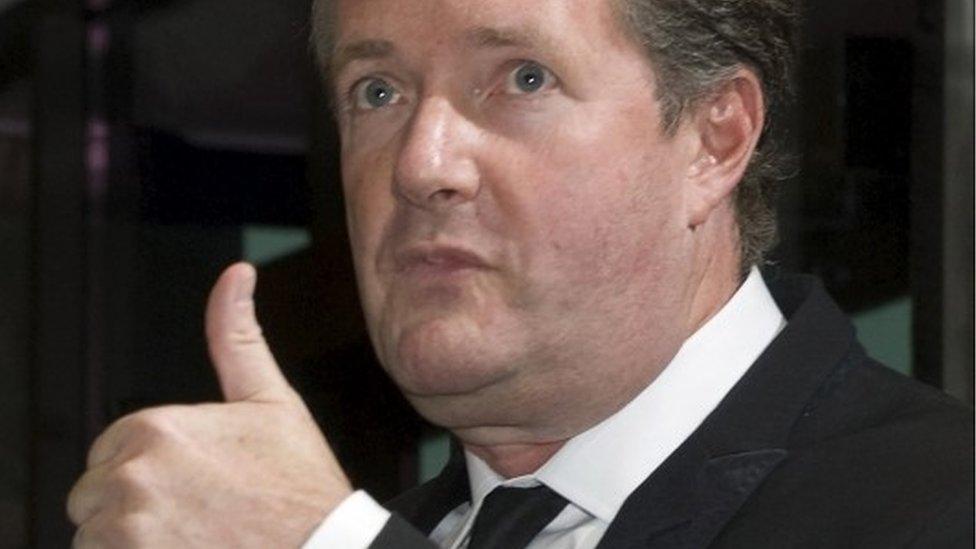
Piers Morgan always denied any involvement in phone hacking
Mr Morgan tweeted, external: "As I've said since the investigation began four years ago, I've never hacked a phone and nor have I ever told anybody to hack a phone.
"Thanks to all my family & friends, and kind people on here, for all their support. It was greatly appreciated.
"I'm now going to get spectacularly drunk. Happy Christmas."
News UK, formally News International, which publishes newspapers the Sun, the Times and the Sunday Times, said: "We now relish the chance to focus fully on what this company does best - world class professional journalism."
Former NoW deputy editor Neil Wallis, who was found not guilty of conspiring to hack phones, said police had been right to investigate "morally indefensible" behaviour but the investigation had been disproportionate and cost millions of pounds.
But Prof Brian Cathcart, the founder of the press standards campaign Hacked Off, said it was "not over".
"It is not acceptable that companies like this can walk away scot-free," he said.
"We are not safe from these companies unless people are made accountable."
A victim of phone hacking, the TV presenter Anne Diamond, said the investigation had led to the Leveson Inquiry into press standards and a "change of culture".
She told the BBC: "Hacking did stop, some individuals did go to prison - for once the tabloid papers were afraid to act in the reprehensible way they did... so, it hasn't all been pointless. A lot has been achieved."

What is phone hacking?
Phone hacking was a technique used to listen to people's mobile voicemail.
It was used by newspaper staff to target people in the news - celebrities, politicians and crime victims - so they could find angles on stories that would get them ahead of the competition.
They would listen to private messages left on voicemail, make a recording of them, and use the information to help write stories.
Of the nine convictions related to phone hacking, six were News of the World journalists, one had worked as a journalist at the News of the World and the Sunday Mirror, one was a private investigator working for the News of the World and one was a Sunday Mirror journalist.

Operation Weeting
News Group Newspapers was investigated for corporate liability as part of Operation Weeting, with prosecutors considering potential charges for phone hacking and perverting the course of justice.
The CPS said in a prosecution for corporate liability it would have to prove the involvement of someone with the "controlling mind or will" of the company, which it said it could not do for either charge.
It said the company's decision to settle the civil cases brought against it could not be seen as actions which could pervert the course of justice either and there was no evidence to suggest emails were deleted to pervert the course of justice.
Operation Golding
As part of Operation Golding, the CPS looked into allegations of phone hacking against 10 individuals at Mirror Group Newspapers.
The CPS said it had looked at call data from the group which showed a "regular pattern" of two calls being placed to the same number and a large number of calls to voicemail numbers, but it could not prove these were "definite instances of phone hacking".
Additionally, it could not prove the calls were made by particular individuals as Mirror Group journalists often used each other's phones.

Convictions related to phone hacking
Andy Coulson, former News of the World editor, was jailed for 18 months for conspiracy to hack phones following a trial in July 2014.
Ian Edmondson, ex-News of the World news editor, was jailed for eight months in November 2014, after admitting conspiring with private investigator Glenn Mulcaire to listen to victims' voicemail messages
Jules Stenson, ex-News of the World features editor, was given a four-month suspended jail sentence, 200 hours of community service and a £5,000 fine in July this year, after admitting to plotting to hack phones
Greg Miskew, former News of the World news editor, received a six-month prison sentence for conspiracy to hack phones, which he admitted
Neville Thurlbeck, former News of the World news editor and chief reporter, was given a six-month sentence for conspiracy to hack phones, which he admitted
James Weatherup, ex-news editor at the News of the World, received a four-month suspended sentence and 200 hours of community service for conspiracy to hack phones, which he admitted
Dan Evans was given a 10-month suspended jail sentence in July 2014 after admitting two counts of phone hacking - one while a journalist at the News of the World and one while at the Sunday Mirror - as well as making illegal payments to officials and perverting the course of justice
Glenn Mulcaire, private investigator used by News of the World, was given a six-month suspended sentence and 200 hours of community service for conspiracy to hack phones, which he admitted
Graham Johnson, former Sunday Mirror journalist, was given a two-month suspended jail sentence and 100 hours of unpaid community work in December 2014 after pleading guilty to intercepting voicemail messages in 2001
